Noticias previas
INTERVIEW WITH MIGUEL ANGEL ANTOLINEZ OF BILBAO GO SCHOOL
Bilbao Go School was present in the First International Festival of Japan and, of course, will also take part in the Nihon Jaia this year to be held in November in Miribilla’s Sport center “ Bilbao Arena”, in order to promove the beauty oy this antique and amazing game. Go is a strategic game between two players, which is widespread in Korea, Japan and China. Alternately they place back and white stones on the free intersections of a 19x19 board lines. The object: control a portion of the board larger tan the opponent.
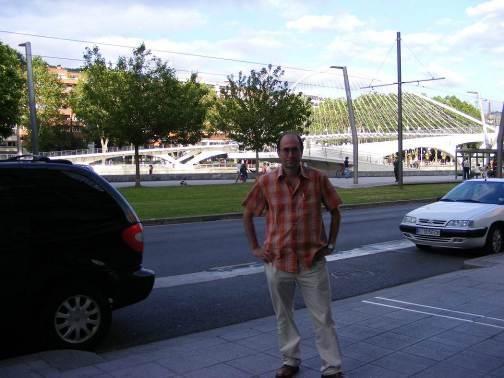
First of all we would like to thank your availability for this interview about the art, discipline, or simply the game of Go, how do you rate?
In spite of being a “sport” since Pekin games in 2008, I would add that there is more than a simple game or sport. In fact it is a more Antique game in the World, with more thant 4000 years. Go was practised in Japan by buddish monks, high standing people in China and Japan.
In a closer and less theoretical approach. I would like to know your personal reasons to get close to Go.
I resume it in my book. I found an advertisement in a magazine called “ AJOBLANCO” in 1979, where it described the game. I practiced Chess an a médium-high level and when I read the article I felt astonished, because I though chess was de king of games. However, it took a while until I discovered the Go Club in Madrid where there was the master Masaru Mikami. At that time, as now, had a 6º grade Dan and agreed to teach the rules and meaning of the game, links with Japanese tradition and other things. That was a real discovery for me and since then, with a short break of a couple of years ( early 90), I have practiced Go till today.
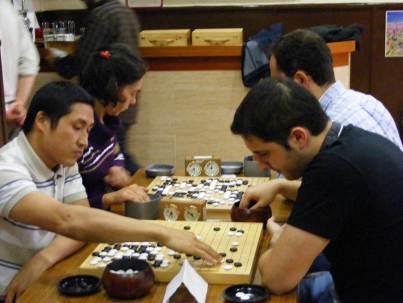
Which grade are you?
I am 3rd Dan, the category which has allowed me to participate in Pekin Games, representing the Spanish Olimpic Team. Soy 3 Dan, que es la categoría que me ha permitido participar en las Olimpiadas de Pekín como representante del equipo olímpico español. In fact, we are still very few and is easy to highlight. Being in the last Olympics in Benjing in 2008 was an extraordinary experience and the culmination of all my work for many years in favor of Go.
When we talk about your personal love journey with Go, we can’t ignore the work of his expansion, finally you have created a Club…
Yes, Bilbao Go School.
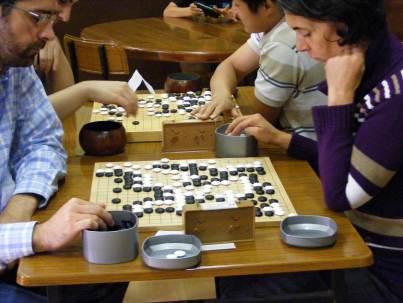
Tell me, which kind of activities do you make?
Basically, we play and teach the other who are interested. By the moment we haven’t organize any tournament because we haven’t got the infraestructure needed.We have participate in other tournaments. But the most important thing now is the expansion of the game, for the value itself. I would emphasize five aspects of Go:
Firstly, the fun aspect, of course, this is a fascinating, extraordinary game and when you understand the game it takes you. Secondly, the sporting game, Go can be as a mental competition, very hard indeed. Third consider also the educational training for children, young adults and older people. Fourth the therapeutic value, because his practice prevents mental illness such as Alzheimer (there is not known player with this illness) and because it gets the whole brain active (right and left side). Finally and most important, the philosophic value, maybe the principal reason for me to play and continue teaching and spreading.
Can we get deeper in this last aspect. While I read your book I have interested in Go genealogy. From this point of view, fun aspect is posterior than another utilities, related to chamans universe, antique mathematic theories, astrologic and astronomic ideas, and associated to I Ching.
Yes of course. Go’s relations to I Ching is evident because his first written signs in the oracle book were not lines as we know actually, they all were black and White circles. There are a lot of legends about it, buy anyway philosophy in I Ching and Taoism, can de observed in the board of Go. That's the reason why taoist masters were big defenders of Go practice. Immortal humans in tradition were represented in carved art playing Go. Those images are associated with Yin and Yang, polarity law, duality existing in nature , white and black, day and night, light and shadow… In the board we can see those two forces and the movement of players to achieve balance. Those forces are on board balanced when players try to win de game. And those forces, duality, is present in life, and that is the reason why I studied about it, triying to find the similarities between the game development and the logical life.
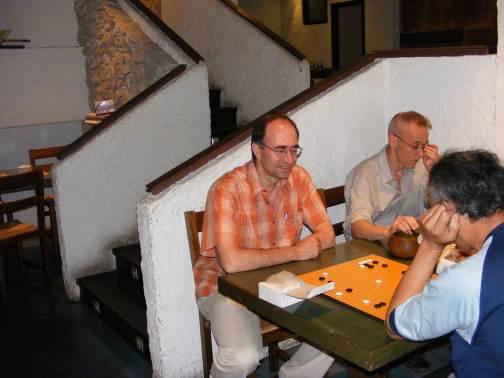
So we can resume, that similarities with yin and yang, in Go try to success one to another in harmony. White and black players plays in complementary.
It must be that way, because there can be different opinions about it, in my experience along the years I have learned that, if you play only to win with good results and you forgot the opponent, his strategy and intentions, is not positive and the results are not good. Go shows you to take part in both sides. In fact the best play must be good for both, and best for me too. It is like life, you must not being interested only in your interests: money, success, work… it is completely necessary to be aware of the other side, because if we don’t we will fail. That other side, we could call adversity ( difficult, troubles…) is represented on board by our opponent, and we must respect him and take into account.
Humm... if I am right, I understand Go tries to point you strategically in the other side to play, is it?
It represents the find of the balance to be aware of my position but also de positioning of the other. It is duality expression of yin-yang, of life, on the board. Take account of what I like, my interests, and my claims, and those things I don’t like at all, what is annoying and damages. These is the duality we must learn to balance, and Go is there and is ok to experiment and learn the way.
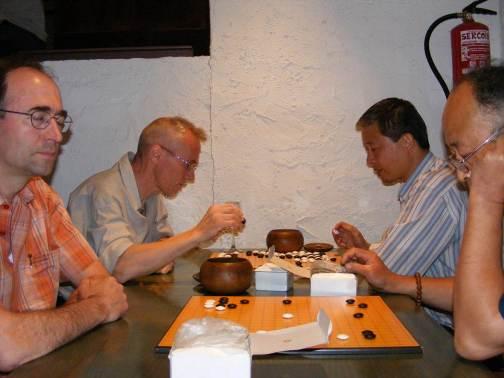
That reminds me of C.G Jung's commentaries about I Ching by R.Wilhelm.
Yes, I had that book in my hands and it is really interesting. I think it is one of best versions I have read. Anyway introducing the Book of Mutations is a deeper concept.
In other words, we are talking about another way to organize space and time.
I wouldn’t say it that way. The game allows to feel the timelessness. Go lets you put yourself into out of time to get you out, by their degree of abstraction, from the concrete. Normally we move into the concrete. For example, we are making activities in searching something specific, I go somewhere, I buy shoes or peel an orange… however, the Go forces us to do something concrete as the game is, allows you to get immersed in abstraction. In other words, a person who does not know Go see the board and see the stones and it seems chaotic for him; but in the case of a player, in boards, and ideas and strategy see where is the danger, who can he get out from danger, who obtain territory expansion, etc. You can be for hours in this world of ideas in Go, concretation takes you away for time, and space. When the game is finished you could see around and wonder: where I am? And later watch the time to see how long it took. That is the reason why Taoist loved playing Go, because of the sensation of transcendence.
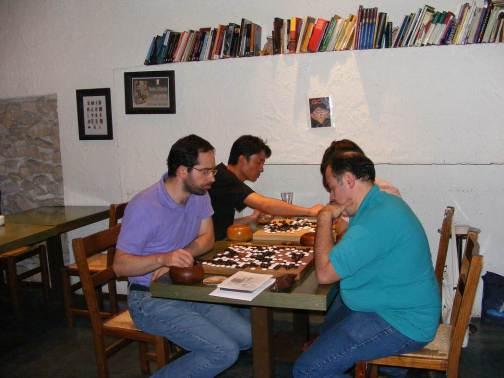
You mentioned Chess as a game to kill the opponent, can you explain the differences between chess and Go in this characteristic?
At first sight, chess philosophy is “checkmate” while Go is based in the idea “ live and let live”. This difference is found over the time, when you learn top lay well to Go. You come to the conclusion that you let live in some measure to the opponent baceuse you can’t exterminate them at all. On the other hand, it is significant that in case of chess computers are already capable of beating the world champion, but the Go is not. Go, is by the moment and I think for a long time, a game for humans.
Are there Go games for PC?
There are some. I have one in my pc, but it plays like a medium level not better. Think about chess, which movements are limited to a 8x8 board, while in Go board is 19x19.
That’s a big number of combinations…
And the dynamic is different, because here is not like chess where the stones or riles have an specific and limited movement. Computers don’t have the strategic ability to Go because there is a larger space and the amount of movement is really impressive.Therefore, computers works from gib analytical systems, but lacks, for example, os assessment capacity, the have no psychology, creativity, imagination… in short, human attributes needed to play Go. It begins with an empty board and, increasingly, players builds territories and areas. Chess is just the opposite, the board is full os pieces and you must play destroying and cleaning those board. There is a Japanese author who says that the leaders in governments in World were good Go players, there could be a situation in peace without no wars. War is like a chess game, it is what Bush made in Iran, looking for checkmate. In Go as this Japanese author says, you must look for a equitable distribution, not killing the opponent,it is divided, because there is room for everyone. In go the fact is that the most intelligent, the most capable, is the player who is stronger to win to more points in board, but there is no humiliation for the opponent, no kill. Philosophy in Go is beauty because this way you can lose the battle but you don’t fell that, you are not humiliated, you are still on the board alive.
Those values are similar to ones in The Art of War.
There it is. Sun Tzu says too. The treaty could have been titled The Art Of Peace, because one of the conclusions you can reached after reading is the best general is not winning many battles, but winning without fighting, because he achieved a force degree that does not need to prove any race. In go there is something about this. The goal is that before an attack stronger yourself. Sun Tzu says that it is necessary to make you strong as a rock, and the enemy will hit like an egg shell. This is not to annihilate the other hand, to fight, to attack, to assault, it is strengthened self and, as one becomes. You can apply this to life in general: you must not fight anybody, you must be the best, doing your best, in morality, that is enough.
Another aspect in your book is the mythological approach to the game of Go.You mention C.G.Jung regarding this matter, and in that sense, I don’t know if you are agree in considering the board table and rules as a complex mandalic symbol holding an universal wisdom archetypal background.
Of course... I make this relationship because, when you're playing Go in full concentration on the board you see circles, crosses, squares ... and all these forms refer to an ancestral symbolism. The circle symbolizes completness and the spiritual, the cross (which is a very large symbol even after incorporating Christianity) has to do with duality, vertical and horizontal line, the square, however, symbolizes the material and, This is contrasted to the circle. Thus, the concentration in geometric figures closely resembles the concentration Buddhist mandalas. It is not the same to be enthralled with the television screen, for example, to be focused on geometric forms archetypal symbology ancient treasure.
In line with what you have commented on the levels of abstraction, is it possible to argue that in Go, the same or similar shape to the relationship with the image of the Buddhist mandala, the game has on some meditative activity?
It could be said that way, but be aware that the Go, in principle, is a game and can be practiced in many ways. In other words, you can practice as a simple game or you can play like you're in front of a mandala, a Buddhist monk meditating. I have not reached as far, I admit. I'm not saying it is not possible, but I most probably relate to the nature and the human personality. In this sense, is closer to martial arts. Because, to tell you the truth, I think the word meditation is often misinterpreted. Before learning to meditate, you must first learn to concentrate. If you can not concentrate, if you can not control your mind, it is very difficult to make a meditation. Therefore, I would say that the Go help the pre-meditation in Buddhism is called the given, that is, learn to concentrate on something and absolute disregard everything outside. You can test, focus on one point, for example, a candle, a stick of incense, a figure or a mandala and get your mind set your attention on it, without being distracted by anything. Is difficult. However, Go will help to strengthen this.
According to the universal background we were talking about earlier and which is represented on the Go, I think it may be significant that this game is not confined to Japan, but extends to China and Korea.
That is so. Recall that is the oldest game in existence. In the West only really been known in the late nineteenth century. This is curious because historically there were more opportunities, from Marco Polo, from the Jesuit, Matteo Ricci, etc., But are not seized. It is in the period when the bolt opens Japanese (sakoku) and get the Americans, when the Go jump in the West. But earlier, during the Edo period, in the isolation, the Japanese developed the technique of Go to a high level.
It is also curious how, without any support, just because people see the value of play, has been extended to Western factly. Today, we're used to that everything is known through advertising, marketing campaign, etc.. Go there with all that. Although thanks to the internet it must be said, is expanding in a non-fast-paced, not too fast, but steady.
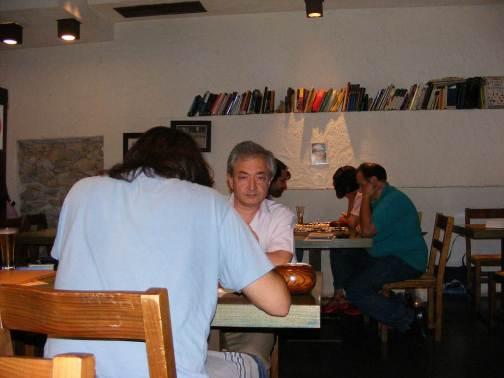
Go is practised as well in Korea and China, which is the situation of those countries?
China is the largest country in the world and won the Olympics but tough battle with the Koreans. Korea now has world champion. World Champion there is a level of prestige similar to what would have here a galaxy, it is amazing. Go in that country is almost popular, and I say "almost" because it is not an easy game to popularize. It's like chess in our environment. You can practice many people but it is hard to be popular because it is a complex game. People generally prefer to play games easier. In any case, in Korea there is a high level practitioners. We have introduced through schools, universities, and have a TV channel exclusively dedicated to “baduk”, which is referred to as Go in Korea.
One of the ways in which I started to learn Go, you and I confessed at the time, is through the work of Y. Kawabata and his novel The Master of Go. In the famous competition that tells Y. Kawabata the struggle between the old master and the impetuosity of youth also seems to reflect the transition between the old and new Japan. Can we also speak of an evolving Go and leave behind old Variants?
Very interesting. It is said, and here I agree, that this famous game that is told in the novel is the symbol of a new era, the transition from ancient Japan to modern Japan that is open late late nineteenth century to the West . I believe that this change in time there are elements that are lost and others are acquired. What is lost? or, at least, what is relegated to the background?, traditional and philosophical value of Go against a more competitive, which is the current premium.
But I remember again the educational value of Go, which lets you learn to discover things for yourself and this is essential because education is not to learn a lot of memory, it is that you can drive your life yourself. It's like learning to drive, you know the highway code memory, but then you stand in front of a steering wheel and any unexpected situation you must know what to do. The Go teaches you to adapt and behave with any new situation.
As for the formal aspect of Go, witnessing a historical process of standardization of the rules after the establishment, in 1924, the Nihon Ki-in, which attempts to draw together the various pre-existing schools am I right?
Yes,they are adopted as rules of the game the Japanese rules. Earlier I said that the rules are very simple and they are, but there are small differences between the Chinese and the system that developed after the Japanese. It is a matter of form, so that the end result is virtually unchanged. In the West took to the Japanese rules, ie, how points are counted at the end, etc. Doesn’t matter.
I would like to comment on the personal relationship you had with the teacher Masaru Mikami, who I've met in Madrid, and its role in the dissemination and extension of Go.
My relationship with Mikami was good from the outset and remains till today. What happens is that I've grown as a player and he is more concerned with young people and a future. Also, I live in Madrid and Bilbao and that's an obstacle. In my early Masaru Mikami played a key role, was my real master Go. We spent several weeks living at home during the summer, where he was turning to the people, a very small group, and taught us brilliantly and it is a good teacher and a child loves Go. As far as I'm concerned, there are only words of thanks. However, the deeper and philosophical dimension of the game has been taken by other routes. I would also add that every player has his Master of Go, to recognize or not recognize it. In the Edo period all schools had a teacher, and had disciples. All this system still exists today, namely the master-disciple relationship, at least in Eastern countries. And just so happens to Go about life. If you look in the East, Buddhism, Zen philosophy, there are still teachers also learn how to live. From this point of view, I have established a very clear relationship between the Go and life itself. So, I can play Go, but also explore the philosophical value of the game. And that relationship is very useful to me. You can also play Go only as a hobby, fine, but it can become tiresome. Many people, when no results in competitions and can not give anymore, he leaves. The key is to delve into the philosophical and associate with other teachings such as Buddhism, Taoism, etc.
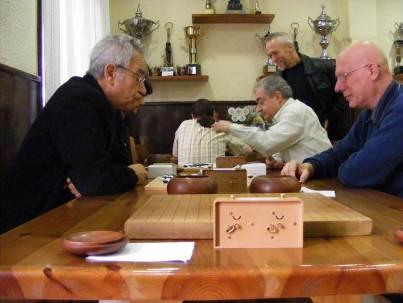
In this philosophical dimension on which to call attention have you been self-taught or have coincided with a Go master who draws you to that other universe?
In the world of Go I have not found these teachers. Mikami and Go are my teachers, I have my teacher in life. Just as I woke up to Mikami Go, my teacher woke me up in life. Go is a very useful tool, but I must say that I used for testing only. What is real life is where it really "you play it." Although you can view life as a simple game, but there is a risk, and that is if goes wrong you can lose things more valuable than a simple game of Go.
How do you see the future of go from a social or even expansionist viewpoint?
I am optimistic. I think the Go will spread and eventually perform as many people. Without doubt, the Government will help make people happier, to better enjoy leisure time and better known to himself and others. The future of Go is very good, which happens to be slow. He has spent more than a century since it entered the West and can go another century before it is actually known. However, as I said before, this is an inexorable process.
What advice would you give to the person you want to start on Go?
I would ask first if you like games. If they say yes, I would say learn to play! since it is the most fascinating game that exists. I try and if, after starting, make sure you do not like or that is too difficult or do not have time ... it's your decision. But if you like and understand it, to persevere, is a lucky person.
Before closing, I would like you to add something that has been omitted and that you would like especially to stress.
Well, I think, simply, I could say that Go is the best choice for entertainment that I know today. It is an environmental activity, clean, do not need money. Help develop your intelligence. You can help improve everything. And most importantly, as the Go is a miniature representation of life, while having fun and enjoy playing, you also have at your disposal some tips to learn to live and enjoy life.



